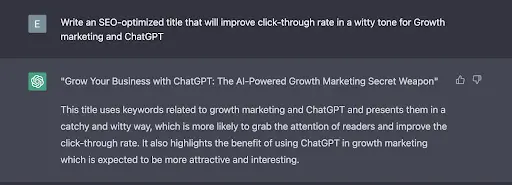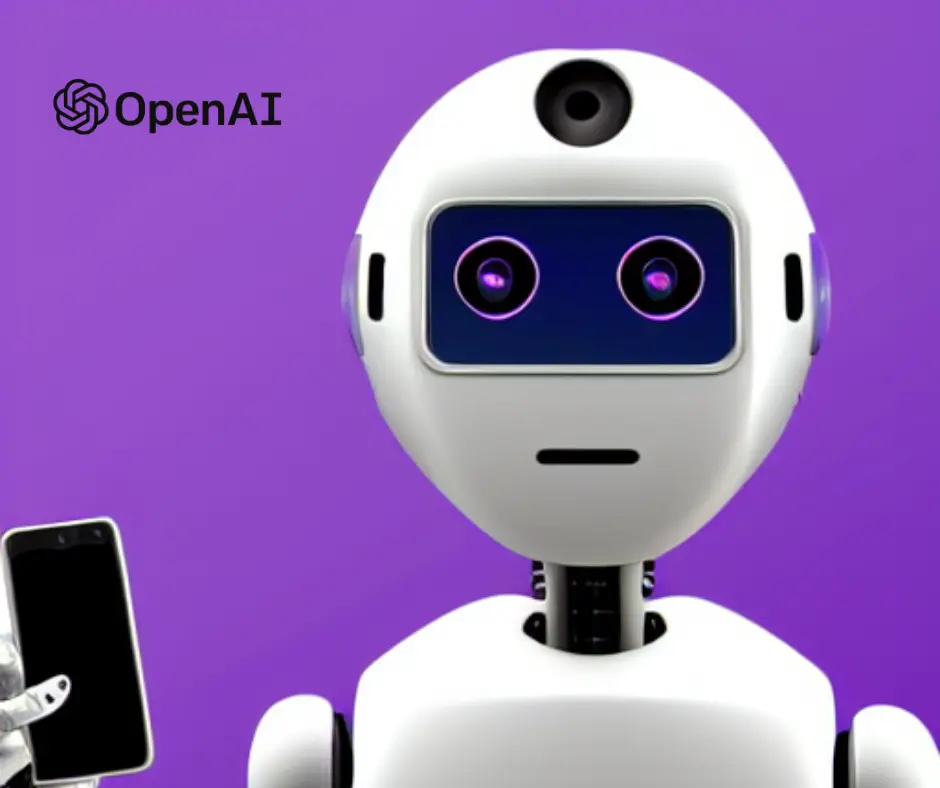ChatGPT is here for the marketing industry too! If you’re not living in a cave, you’ve probably heard of ChatGPT and its incredible power. While some may be trembling at the thought of A.I. taking their job, many are wise enough to use it to make their work a piece of cake.
For growth marketers, this means more opportunities to test and expand their efforts.
Since Openai launched the tool, people have been trying to find new creative ways to utilize the tool. They’re using it to generate code, write resumes, and even write songs. Marketers have joined the hype and are exploring ways ChatGPT can be effective without jeopardizing quality. Generating content and writing website copy and product descriptions are just a few ways ChatCPT is supporting marketers. However, not to be the party popper here, but ChatGPT is a machine learning model, and the output generated may not always be perfect; human review and editing may be required.
So, we’ve been testing and wanted to share how A.I. improves our work life while ensuring we’re staying on top of the game and not compromising on quality.
Unlocking the Potential of ChatGPT for Marketing: An SEO Perspective
ChatGPT isn’t killing SEO. Not for now, at least. It’s only making it more effective. We’ve witnessed an ongoing debate rather ChatGPT will outrun Googe and change search engine optimization (SEO).
Keywords Research
As much as we love Ahrefes, their Related Keyword tool can be time-consuming. ChatGPT can speed this process by creating a list of long-tail keywords to give you a head start on the research.
Yet, don’t expect them to do the work for you. You’ll want to know the metrics behind your keywords, which ChatGPT doesn’t offer. (Please refer to the accompanying image.)

Semantic Keywords
Semantic keywords are terms similar to your keyword(s) so that Google crawlers better understand your content. From an SEO perspective, having more semantically related keywords means that your page provides more context on a topic and performs better in search results.
It used to take hours to build a list of semantic keywords, and that has changed to second with ChatGPT.
Classify your keywords based on the intent
Classifying keywords based can be very helpful when you’re creating an SEO strategy and want to determine the user’s purpose behind the search query. Leading to the creation of more relevant content and campaigns.
You can ask ChatGPT to do it for you now and save yourself a lot of time. Simply copy your list of keywords and ask ChatGPT to “classify the following keywords based on their search intent, whether for informational, transactional or commercial purpose.” Thank us later; we’re not done!
P.S. If you’re considering utilizing ChatGPT for keyword research, we recommend checking for keyword volume, cost-per-click, and competitiveness. By understanding these metrics, you can prioritize keywords with higher search volume and lower competition, which may result in more effective marketing campaigns and better ROI. This will ensure that accurate data back your strategy.
Catchy article titles
Content creation is crucial to rank higher by search engines. Interesting headlines encourage clicks and purchases; that’s why it often takes a write bunch of them to find the write one.
You can ask ChatGPT now to write a title with a specific tone intent that considers the click-through rate. Take this article, for example.

The suggested title wasn’t doing it for us, but the accompanying description provided a foundation for brainstorming. However, if you’re not in the mood to put that brain to work, ask the tool to write 10 SEO-optimized titles and pick your favorite.
Content Creation: How Marketing Can Maximize the Capabilities of ChatGPT
First and foremost, ChatGPT: Great for inspiration, not so much for writing the whole enchilada. Trust us, stick to the appetizers. No, we don’t recommend writing a whole article using an A.I. generated tool. Why? Well, for starters, the human touch is in demand, so now is not the time to gatekeep on giving value. Secondly, Google’s Search Advocate, John Mueller, says content automatically generated with A.I. writing tools is considered spam, according to the search engine’s webmaster guidelines.
However, there are many ways ChatGPT can help you with content creation. Here are a few you can start with:
- Ask ChatGPT to develop a list of potential topics related to your industry or niche.
- Use ChatGPT to generate a list of frequently asked questions in your industry and use that to create a comprehensive FAQ page or blog post.
- Ask ChatGPT to generate a list of potential case studies or testimonials to feature on your website.
- Use ChatGPT to generate ideas for a webinar or other educational content to offer to your audience.
ChatGPT has come in handy to social media marketers too. From strategy ideas to writing and improving copywriting. Invested social media marketers also use the tool to avoid time-consuming tasks like engaging with their audiences. As an SMM, the pressure to write a funny and kind(comment) reply is high, so now they’re utilizing A.I. to write replies for them.
Create Unique Images for your Website
With the launch of chatGPT, we’ve seen the rise of utilizing A.I. tools to support the human power to get things done. Along with writing articles, A.I. tools generate unique and customized images. Openai started the move with DALL·E 2, a system that can create realistic images and art from natural language descriptions. Since then, Canva has joined this trend with their Free Online Text to Image App.
We’re yet to see where this will take the creative industry.
Is ChatGPT Transforming Email Marketing?
As marketers, we know that email marketing is only effective when you’ve segmented your audience and personalized your cold outreach.
So using A.I. to write a sequence using ChatGPT is not of our top recommendations. However, you can utilize the A.I. tool to create a list of subject lines or call-to-actions for your brainstorming session.
Additionally, if you’re looking to experiment with frameworks like ‘Expectation-Surprise’ or ‘Exlusive-Inclusive’ but don’t know how to adopt it for your niche, ask ChatGPT. Then, personalize as needed for your audience.
Using AI tools to test and experiment more might help your business grow faster. Offering an opportunity for marketers to focus on more deep work instead of small tasks. With this being said, strategies are yet to be adapted and strategists have yet to let go of their findings. The world has changed.
Ultimately, the launch of ChatGPT is changing the marketing industry (among other industries). Marketers should adapt to these changes and embrace the positive aspect of avoiding time-consuming tasks with more creative work. As Artificial Intelligence continues to advance, it is creating new opportunities for businesses to grow and evolve. The time is now to take advantage of these opportunities and fully embrace the power of AI in order to stay competitive and thrive in today’s ever-changing market.
Meet The Author Of This Article

Hi! I’m Elsa
I’m a Growth Marketer focusing on growing B2B tech companies with a background in content creation and brand awareness.
I progressively work on brand, business, and team growth to help companies achieve their goals. I’m currently using content writing to share my own personal growth path and experience.


